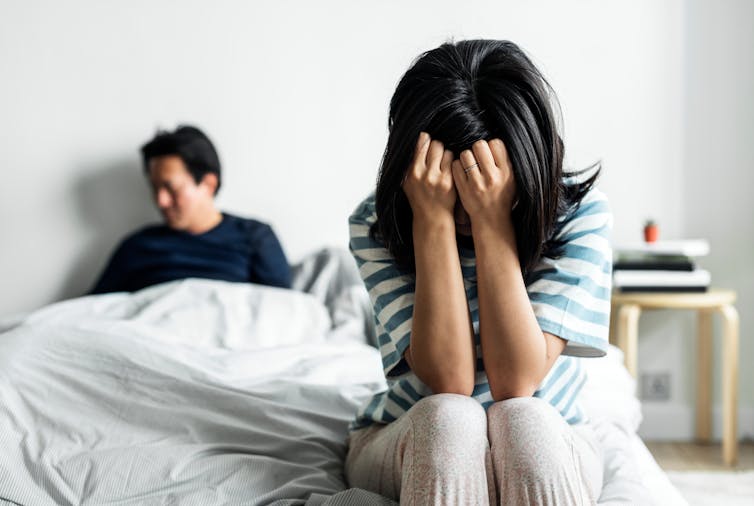Vaginismus: the common condition leading to painful sex
- Written by Anita M Elias, Senior lecturer, Dept O & G, Monash University
The social and cultural messages we receive around sex give the impression everyone’s “doing it” and it’s always fun and enjoyable. But for many people, having sexual intercourse is extremely painful or impossible. One of the leading causes of painful sex is vaginismus.
Vaginismus is an extremely common condition, that can have a huge impact on women, their partners and relationships. Yet many with it feel alone and without hope as it’s rarely talked about.
But women don’t need to live with it — it’s easy to diagnose and it’s treatable.
Painful sex
Australian research shows about 20% of women and 2% of men experience painful sex.
Male sexual problems, such as erectile dysfunction, have been in the public awareness since the advent of “the little blue pill” — Viagra. But sexual difficulties in women are missing from the story.
Without the push of pharmaceutical industries, awareness and knowledge about sexual difficulties in women (or people with vaginas who don’t identify as women) has not advanced in the same way as it has for men.
Read more: Sex and women's diseases: it's common and important to include men's perspectives
A recent study, which is not yet published, found, in 2019 57% of female patients who attended the Sexual Medicine and Therapy clinic (Monash Health) attended because of painful sex. 60% of them had Vaginismus. Almost half of these women had experienced this for more than five years, and it had occurred in around one in five of these women for ten or more years.
What is vaginismus?
Vaginismus occurs when someone has persistent or recurrent difficulties in allowing vaginal entry of a penis, finger or any object, despite her wish to do so.
Some women experience fear, difficulties or pain from the first time they try to insert something into their vagina and instead of getting better, it can get worse over time. This is called “primary vaginismus”.
Others can be fine for years and develop pain at some later date. This is “secondary vaginismus”.
Vaginismus can be mild, moderate or severe. The pain is often described as burning, cramping, or a tight feeling. And for some, nothing can go into the vagina. Sufferers describe it as like hitting a brick wall.
The impact of vaginismus
Those with undiagnosed vaginismus can feel embarrassed or abnormal which can deter them from seeking help. And undiagnosed vaginismus can significantly impact self-esteem, and lead to anxiety or depression.
Read more: 'Is it normal to get sore down there after sex?'
Those with vaginismus may avoid being sexual, as it can be a very painful experience. They also may avoid any intimacy for fear that it may lead to “sex”. This can significantly impact relationships, leading to distance and conflict.
 Women with vaginismus may avoid any intimacy for fear it may lead to painful sex. This can significantly impact relationships leading to distance and conflict.
Shutterstock
Women with vaginismus may avoid any intimacy for fear it may lead to painful sex. This can significantly impact relationships leading to distance and conflict.
Shutterstock
It can also inhibit single people from forming relationships. They may avoid socialising, dating and meeting new partners, feeling burdened with a “shameful secret”.
Causes
When it comes to sex (and life), you can’t separate the mind and the body. Vaginismus is no exception. Underlying causes are extremely variable and often influenced by multiple factors.
Read more: Health Check: what is normal vaginal discharge and what's not?
Sometimes there is no obvious cause, but common factors in the development of primary vaginismus include:
fear or anxiety: about pain, pregnancy or sexually transmitted infections. Generalised anxiety or other anxiety disorders can also cause vaginismus
taboos: cultural or religious taboos around sex, or inner conflict about whether to be sexual or not
unaroused sex: having sex when you don’t really want to
history of abuse: a history of physical, emotional or sexual trauma or abuse
unrealistic expectations: of sex leading to fear of not being “good enough”.
Secondary vaginismus can occur due to any of the above or after anything that leads to painful sex, such as:
relationship problems: leading to lack of libido or arousal
infections or skin problems: vaginal infections, such as thrush and vulval dermatological (skin) problems or Vulvodynia can cause vaginismus
gynaecological problems: such as endometriosis, gynaecological (or breast) cancer and it’s treatment or pelvic surgery
pregnancy: vaginismus can occur after pregnancy, delivery or as a new parent.
A normal reaction to any anxiety and fear is a tightening of muscles, and vaginismus occurs when this happens in the pelvic floor muscles. A strong pelvic floor is important, but we also need to learn how to relax it, when we want to.
Read more: 1 in 10 women are affected by endometriosis. So why does it take so long to diagnose?
Diagnosis
Vaginismus can usually be diagnosed by taking a careful history and looking at which factors may be causing it.
 A physical examination is important for anyone experiencing painful sex, so no other contributing physical conditions are missed.
Shutterstock
A physical examination is important for anyone experiencing painful sex, so no other contributing physical conditions are missed.
Shutterstock
Those who suspect they may have vaginismus should initially seek help from GPs, gynaecologists, pelvic floor physiotherapists, sexologists or psychotherapists who have experience with this condition.
Medical professionals who are experienced in treating the condition will do an examination in a gentle, empowering way, only when the woman is ready to, so she is not distressed or traumatised in any way.
Read more: Isolation could improve how we think about and navigate sex and relationships
Treatment
Women should be reassured tightness in the pelvic floor is an involuntary, protective response they can learn to overcome, with help.
A multidisciplinary approach of management has been shown to be most effective, this includes:
education about vaginismus, the pelvic floor and sex
medical management of any underlying physical conditions
psychological management of any underlying worries
pelvic floor physiotherapy can help women learn how to relax, generally and in the pelvic floor
learning about what is pleasurable, as unaroused sex is a common cause of painful sex.
Woman should also be empowered to feel free to choose if, when and how to be sexual. Many women are either coerced into sex or are compliant for the sake of their partner’s needs.
They need to be supported to recognise and express their own needs and wishes. Although women can continue to be sexual in any way they wish, it’s vital to stop doing anything that hurts, such as continuing to try to have penetrative sex, while vaginismus is being treated.
Authors: Anita M Elias, Senior lecturer, Dept O & G, Monash University
Read more https://theconversation.com/vaginismus-the-common-condition-leading-to-painful-sex-148801





